
Refusal to believe until proof is given is a rational position; denial of all outside of our own limited experience is absurd.
.jpg)
Liberty is a great celestial Goddess, strong, beneficent, and austere, and she can never descend upon a nation by the shouting of crowds, nor by arguments of unbridled passion, nor by the hatred of class against class.
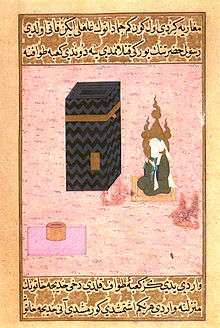
A prophet is always much wider than his followers, much more liberal than those who label themselves with his name.
Sun-worship and pure forms of nature-worship were, in their day, noble religions, highly allegorical but full of profound truth and knowledge.
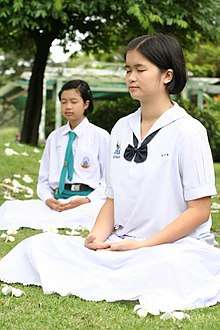
Mysticism is the realisation of God, of the Universal Self.
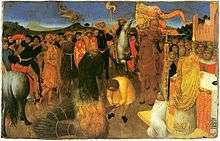
The command to “preach the gospel to every creature” – though admittedly by doubtful authenticity – has been interpreted as forbidding the teaching of Gnosis to a few, and has apparently erased the less popular Teacher “Give not that is holy unto the dogs, neither cast ye your pearls before swine.”
Annie Besant (1 October 1847 – 20 September 1933) was a prominent British socialist, theosophist, women's rights activist, writer and orator. In 1890 Besant met Helena Blavatsky and over the next few years her interest in Theosophy grew while her interest in secular matters waned. She became a member of the Theosophical Society and a prominent lecturer on the subject.
Profoundly interesting is this world-tragedy of conflict to those who see in it a necessary preparation, a clearing of the ground, for the coming of the World-Teacher and for the new civilisation... through this Armageddon the world will pass into a realm of peace, of brotherhood, of co-operation, and will forget the darkness and the terrors of the night in the joy that cometh in the morning... (image: Besanti n 1897)
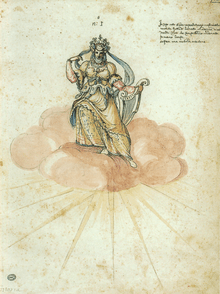
Every person, every race, every nation, has its own particular keynote which it brings to the general chord of life and of humanity. Life is not a monotone but a many-stringed harmony, and to this harmony is contributed a distinctive note by each individual.
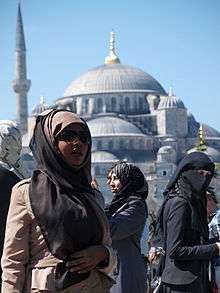
Muhammadan law in its relation to women, is a pattern to European law. Look back to the history of Islam, and you will find that women have often taken leading places - on the throne, in the battle-field, in politics, in literature, poetry..
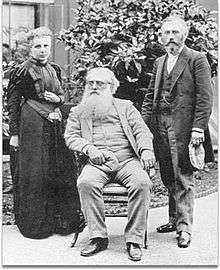
Annie Besant, Henry Steel Olcott and William Quan Judge in London May 1891
Quotes
- Refusal to believe until proof is given is a rational position; denial of all outside of our own limited experience is absurd.
- Annie Besant: An Autobiography (1893), p. 357; 3rd edition (1908), p. 357
- We find amongst animals, as amongst men, power of feeling pleasure, power of feeling pain; we see them moved by love and by hate; we see them feeling terror and attraction; we recognize in them powers of sensation closely akin to our own, and while we transcend them immensely in intellect, yet, in mere passional characteristics our natures and the animals' are closely allied. We know that when they feel terror, that terror means suffering. We know that when a wound is inflicted, that wound means pain to them. We know that threats bring to them suffering; they have a feeling of shrinking, of fear, of absence of friendly relations, and at once we begin to see that in our relations to the animal kingdom a duty arises which all thoughtful and compassionate minds should recognize - the duty that because we are stronger in mind than the animals, we are or ought to be their guardians and helpers, not their tyrants and oppressors, and we have no right to cause them suffering and terror merely for the gratification of the palate, merely for an added luxury to our own lives.
- No one can eat the flesh of a slaughtered animal without having used the hand of a man as slaughterer. Suppose that we had to kill for ourselves the creatures whose bodies we would fain have upon our table, is there one woman in a hundred who would go to the slaughterhouse to slay the bullock, the calf, the sheep or the pig?... Dare we call ourselves refined if we purchase our refinement by the brutalization of others, and demand that some should be brutal in order that we may eat the results of their brutality? We are not free from the brutalizing results of that trade simply because we take no direct part in it.
- A speech given at Manchester UK (18 October 1897)
- If people want to eat meat, they should kill the animals for themselves... Nor should they say that if they did not do it the slaughter would still go on... Every person who eats meat takes a share in that degradation of his fellow-men; on him and on her personally lies the share, and personally lies the responsibility.
- Vegetarianism in the Light of Theosophy(1913), p. 18-20
- Profoundly interesting is this world-tragedy of conflict to those who see in it a necessary preparation, a clearing of the ground, for the coming of the World-Teacher and for the new civilisation... The terrible lesson now being taught, the widespread suffering, the devastation by sword and fire, the poverty caused by the dislocation of trade, the tension, the bankruptcies... But through this Armageddon the world will pass into a realm of peace, of brotherhood, of co-operation, and will forget the darkness and the terrors of the night in the joy that cometh in the morning...
- The Theosophist (October 1914)
- Liberty is a great celestial Goddess, strong, beneficent, and austere, and she can never descend upon a nation by the shouting of crowds, nor by arguments of unbridled passion, nor by the hatred of class against class.
- The true Mystic, realising God, has no need of any Scriptures, for he has touched the source whence all Scriptures flow.
- Better remain silent, better not even think, if you are not prepared to act.
- Every person, every race, every nation, has its own particular keynote which it brings to the general chord of life and of humanity. Life is not a monotone but a many-stringed harmony, and to this harmony is contributed a distinctive note by each individual.
- A prophet is always much wider than his followers, much more liberal than those who label themselves with his name.
- I often think that woman is more free in Islam than in Christianity. Woman is more protected by Islam than by the faith which preaches monogamy. In AI Quran the law about woman is juster and more liberal.
- Muhammadan law in its relation to women, is a pattern to European law. Look back to the history of Islam, and you will find that women have often taken leading places - on the throne, in the battle-field, in politics, in literature, poetry, etc.
- That is the true definition of sin; when knowing right you do the lower, ah, then you sin. Where there is no knowledge, sin is not present.
- Empty-brained triflers who have never tried to think, who take their creed as they take their fashions, speak of atheism as the outcome of foul life and vicious desires.
- Evil is only imperfection, that which is not complete, which is becoming, but has not yet found its end.
- (On H.P.B. (H.P. Blavatsky))And we, who lived around her, who in closest intimacy watched her day after day, we bear witness to the unselfish beauty of her life, the nobility of her character, and we lay at her feet our most reverent gratitude for knowledge gained, lives purified, strength developed.
- Annie Besant, An Autobiography Chapter XIV
- And thus I came through storm to peace, not to the peace of an untroubled sea of outer life, which no strong soul can crave, but to an inner peace that outer troubles may not avail to ruffle—a peace which belongs to the eternal not to the transitory, to the depths not to the shallows of life.
- Annie Besant, An Autobiography Chapter XIV
- For centuries the leaders of Christian thought spoke of women as a necessary evil, and the greatest saints of the Church are those who despise women the most.
- It is not monogamy when there is one legal wife, and mistresses out of sight.
- Thought is just not something objective in our heads. Thought is power – real, objective power. Moreover, the thoughts we create have a life of their own. They have a kind of material reality that affects other people for good or ill – hence our responsibility to chose.
- Control of the tongue! Vital for the man who would try to tread the Noble Eightfold Path, for no harsh or unkind word, no hasty impatient phrase, may escape from the tongue which is consecrated to service, and which must not injure even an enemy; for that which wounds has no place in the Kingdom of Love.
- The Theosophist, Volume 33, p. 183
- Yet that is the most splendid privilege of man, that the true birthright of the human Spirit, to know his own Divinity, and then to realise it, to know his own Divinity and then to manifest it.
- The Theosophist, Volume 33, p. 190
- In concentration, the consciousness is held to a single image; the whole attention of the Knower is fixed on a single point, without wavering or swerving.
- Man, according to the Theosophical teaching, is a sevenfold being, or, in the usual phrase a septenary constitution. Putting it yet in another way, man's nature has seven aspects, may be studied from seven different points of view, is composed of Seven Principles.
- Yoga is a matter of the Spirit and not of the intellect. For just as water will find its way through every obstruction, in order to rise to the level of its source, so does the spirit in man strive upwards ever towards the source whence it came.
- Yoga: The Hatha Yoga and the Raja Yoga, p. backcover
- Karma brings us ever back to rebirth, binds us to the wheel of births and deaths. Good Karma drags us back as relentlessly as bad, and the chain which is wrought out of our virtues holds as firmly and as closely as that forged from our vices.
- Theosophical Review, Volume 17, p. 139
- Sun-worship and pure forms of nature worship were, in their day, noble religions, highly allegorical but full of profound truth and knowledge.
- But no one can eat the flesh of a slaughtered animal without having used the hand of a man as slaughterer. Suppose that we had to kill for ourselves the creatures whose bodies we would fain have upon our table, is there one woman in a hundred who would go to the slaughterhouse to slay the bullock, the calf, the sheep or the pig?
- Humanimal, p. 140
- Against the teachings of eternal torture, of the vicarious influence theory of atonement, of the infallibility of the Bible, I leveled all the strength of my brain and tongue, and I exposed the history of the Christian Church with unsparing hand, its persecutions, its religious wars, its cruelties, its oppressions.
- Mysticism is the realisation of God, of the Universal Self. It is attained either as a realisation of God outside the Mystic, or within himself. In the first case, it is usually reached from within a religion, by exceptionally intense love and devotion, accompanied by purity of life, for only "the pure in heart shall see God".
- Annie Besant Quotes
- The generous wish to share with all what is precious, to spread broadcast priceless truths, to shut out none from the illumination of true knowledge, has resulted in a zeal without discretion that has vulgarised Christianity, and has presented its teachings in a form that often repels the heart and alienates the intellect. The command to “preach the gospel to every creature” – though admittedly by doubtful authenticity – has been interpreted as forbidding the teaching of Gnosis to a few, and has apparently erased the less popular saying of the same Great Teacher “Give not that is holy unto the dogs, neither cast ye your pearls before swine.”
- India demands Home Rule for two reasons, one essential and vital, the other less important but necessary: Firstly, because Freedom is the birthright of every Nation; secondly, because her most important interests are now made subservient to the interests of the British Empire without her consent, and her resources are not utilised for her greatest needs.
- My own life in India, since I came to it in 1893 to make it my home, has been devoted to one purpose, to give back to India her ancient freedom.
- Indian critiques of Gandhi, p. 82
- The destruction of India's village system was the greatest of England's blunders.
- My heart revolts against the spectre of Almighty indifferent to the pain of sentient being. My conscience rebels against the injustice, the cruelty, the inequality that surrounds me on every side. But believe in man, in man’s redeeming power, in man’s remoulding energy, in man’s approaching triumph through knowledge, love and work.
- Indian Political Thought, p. 191
- The body is never more alive than when it is dead; but it is alive in its units, and dead in its totality; alive as a congeries, dead as an organism.
- Death-And After, p. 19
- It Suicide is the deliberate or the hurried action of the man who is trying to get out of a trouble and escape from it. Yet he cannot escape from it...He is wide awake on the other side of death, exactly the same man he was a moment before... no more changed than if he had merely taken off his coat. The result of his losing the physical body is that his capacity for suffering is very much increased....All the part of him that drove him to suicide is there... The result of that is that he has still in him everything which made him commit the act; the consequence of this is that he keeps on committing it, going through the whole of the trouble that drove him up to the final act.
In the Outer Court (1895)
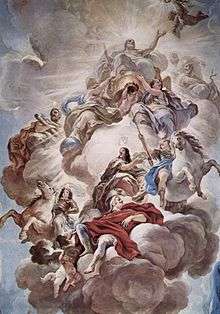
There is no suffering for him who has finished his journey, and abandoned grief, who has freed him self on all sides, and thrown off all fetters.
- Looking at the Temple and the Courts and the mountain road that winds below, we see this picture of human evolution, and the track along which the race is treading, and the Temple that is its goal... along that road round the mountain stands a vast mass of human beings, climbing indeed, but climbing so slowly, rising step after step; sometimes it seems as though for every step forward there is a step backward, and though the trend of the whole mass is upwards it mounts so slowly that the pace is scarcely perceptible. And this aeonian evolution of the race, climbing ever upwards, seems so slow and weary and painful that one wonders how the pilgrims have the heart to climb so long...
- p. 10
- Looking at them, it does not seem as though even progress in intellect, slow as that also is, made the pace very much more rapid. When we look at those whose intellect is scarcely developed, they seem after each day of life to sink to sleep almost on the place they occupied the day before; and when we glance over those who are more highly evolved so far as intellect is concerned, they too are travelling very very slowly, and seem to make small progress in each day of life.
- p. 11
- At last, after many lives of striving, many lives of working, growing purer and nobler and wiser, life after life, the Soul makes a distinct and clear speaking forth of a will that now has grown strong; and when that will announces itself as a clear and definite purpose, no longer the whisper that aspires, but the word that commands, then that resolute will strikes at the gateway which leads to the Outer Court of the Temple, and strikes with a knocking which none may deny— for it has in it the strength of the Soul that is determined to achieve, and that has learned enough to understand the vastness of the task that it undertakes.
- p. 17
- In this way the Soul deliberately labours for growth; deliberately it works at itself, purifying always the lower nature with unceasing effort and with untiring demand; for ever it is comparing itself not with those who are below it but with Those who are above it, ever it is raising its eyes towards Those who have achieved, and not looking downwards towards those who are still only climbing upwards towards the Outer Court.
- p. 34
- And thus daily, and month by month, and year by year, he will work at his mind, training it in these consecutive habits of thought, and he will learn to choose that of which he thinks; he will no longer allow thoughts to come and go; he will no longer permit a thought to grip him and hold him; he will no longer let a thought come into the mind and fix itself there and decline to be evicted; he will be master within his own house... he will say: “No; no such anxiety shall remain within my mind; no such thought shall have shelter within my mind; within this mind nothing stays that is not there by my choice and my invitation, and that which comes uninvited shall be turned outside the limits of my mind.
- p. 60
- Thus thinking and thus practising, you will find this sense grow within you, this sense of calm and of strength and of serenity, so that you will feel as though you were in a place of peace, no matter what the storm in the outer world, and you will see and feel the storm and yet not be shaken by it.
- p. 93
- There is no suffering for him who has finished his journey, and abandoned grief, who has freed him self on all sides, and thrown off all fetters.
- p. 162
The Ancient Wisdom (1897)

As the origin and basis of all religions, it cannot be the antagonist of any: it is indeed their purifier, revealing the valuable inner meaning of much that has become mischievous in its external presentation by the perverseness of ignorance & the accretions of superstition...
- The most sacred duty is filial piety. “God showers his blessings on him who honors and reveres the author of his days,” says Pampelus (De Parentibus, Orelli, op. Cit., ii, 345). Ingratitude towards one’s parents is the blackest of all crimes, writes Perictione ( ibid.,p. 350), who is supposed to have been the mother of Plato. p. 21
- In all that concerns chastity and marriage their principles are of the utmost purity. Everywhere the great teacher recommends chastity and temperance; but at the same time he directs that the married should first become parents before living a life of absolute celibacy, in order that children might be born under favourable conditions for continuing the holy life and succession of the Sacred Science (Iamblichus, Vit. Pythag., and Hierocl., ap. Stob. Serm. xlv, 14). This is exceedingly interesting, for it is precisely the same regulation that is laid down in the Mânava Dharma Shâstra, the great Indian Code. Adultery was most sternly condemned (Iamb., ibid.).
- Right thought is necessary to right conduct, right understanding to right living, and the Divine Wisdom – whether called by its ancient Sanskrit name of Brahma Vidyā, or its modern Greek name of Theosophia, Theosophy – comes to the world as at once an adequate philosophy and an all-embracing religion and ethic. It was once said of the Christian Scriptures by a devotee that they contained shallows in which a child could wade and depths in which a giant must swim. A similar statement might be made of Theosophy, for some of its teachings are so simple and so practical that any person of average intelligence can understand and follow them, while others are so lofty, so profound, that the ablest strains his intellect to contain them and sinks exhausted in the effort.
- The sacred books of the East are the best evidence for the greatness of their authors, for who in later days or in modern times can even approach the spiritual sublimity of their religious thought, the intellectual splendour of their philosophy, the breadth and purity of their ethic? And when we find that these books contain teachings about God, man, and the universe identical in substance under much variety of outer appearance, it does not seem unreasonable to refer to them to a central primary body of doctrine. To that body we give the name Divine Wisdom, in its Greek form: THEOSOPHY.
- As the origin and basis of all religions, it cannot be the antagonist of any: it is indeed their purifier, revealing the valuable inner meaning of much that has become mischievous in its external presentation by the perverseness of ignorance and the accretions of superstition; but it recognises and defends itself in each, and seeks in each to unveil its hidden wisdom.
- The habit of quiet, sustained, and sequential thought, directed to non-worldly subjects, of meditation, of study, develops the mind-body and renders it a better instrument; the effort to cultivate abstract thinking is also useful, as this raises the lower mind towards the higher, and draws into it the subtlest materials of the lower mental plane.
- The main preparation to be made for receiving in the physical vehicle the vibrations of the higher consciousness are: its purification from grosser materials by pure food and pure life; the entire subjugation of the passions, and the cultivation of an even, balanced temper and mind, unaffected by the turmoil and vicissitudes of external life; the habit of quiet meditation on lofty topics, turning the mind away from the objects of the senses, and from the mental images arising from them, and fixing it on higher things; the cessation of hurry, especially of that restless, excitable hurry of the mind, which keeps the brain continually at work and flying from one subject to another; the genuine love for the things of the higher world, that makes them more attractive than the objects of the lower, so that the mind rests contentedly in their companionship as in that of a well-loved friend.
- First he must gain control over his thoughts, the progeny of the restless, unruly mind, hard to curb as the wind. (Bhagavad Gitâ, vi. 34). Steady, daily practice in meditation, in concentration, had begun to reduce this mental rebel to order ere he entered on the probationary Path, and the disciple now works with concentrated energy to complete the task, knowing that the great increase in thought power that will accompany his rapid growth will prove a danger both to others and to himself unless the developing force be thoroughly under his control. Better give a child dynamite as a plaything, than place the creative powers of thought in the hands of the selfish and ambitious.
Esoteric Christianity (The Lesser Mysteries) (1914)
- It is patent to every student of the closing forty years of the last century, that crowds of thoughtful and moral people have slipped away from the churches, because the teachings they received there outraged their intelligence and shocked their moral sense. It is idle to pretend that the widespread agnosticism of this period had its root either in lack of morality or in deliberate crookedness of mind. Everyone who carefully studies the phenomena presented will admit that men of strong intellect have been driven out of Christianity by the crudity of the religious ideas set before them, the contradictions in the authoritative teachings, the views as to God, man, and the universe that no trained intelligence could possibly admit. Nor can it be said that any kind of moral degradation lay at the root of the revolt against the dogmas of the Church. The rebels were not too bad for their religion; on the contrary, it was the religion that was too bad for them. The rebellion against popular Christianity was due to the awakening and the growth of conscience; it was the conscience that revolted, as well as the intelligence, against teachings dishonouring to God and man alike, that represented God as a tyrant, and man as essentially evil, gaining salvation by slavish submission.
- Another precept of Jesus which remains as "a hard saying" to his followers is: "Be ye therefore perfect, even as your Father which is in heaven is perfect". [S. Matt., v, 48. ] The ordinary Christian knows that he cannot possibly obey this command; full of ordinary human frailties and weaknesses, how can he become perfect as God is perfect ? Seeing the impossibility of the achievement set before him, he quietly puts it aside, and thinks no more about it. But seen as the crowning effort of many lives of steady improvement, as the triumph of the God within us over the lower nature, it comes within calculable distance, and we recall the words of Porphyry, how the man who achieves " the paradigmatic virtues is the Father of the Gods",[Ante, p. 24.] and that in the Mysteries these virtues were acquired.
- For so reverent is God to that Spirit which is Himself in man, that He will not even pour into the human soul a flood of strength and life unless that soul is willing to receive it. There must be an opening from below as well as an outpouring from above, the receptiveness of the lower nature as well as the willingness of the higher to give. That is the link between the Christ and the man; that is what the churches have called the outpouring of "divine grace"; that is what is meant by the "faith" necessary to make the grace effective. As Giordano Bruno once put it — the human soul has windows, and can shut those windows close. The sun outside is shining, the light is unchanging; let the windows be opened and the sunlight must stream in. The light of God is beating against the windows of every human soul, and when the windows are thrown open, the soul becomes illuminated. There is no change in God, but there is a change in man; and man's will may not be forced, else were the divine Life in him blocked in its due evolution. Thus in every Christ that rises, all humanity is lifted a step higher, and by His wisdom the ignorance of the whole world is lessened.
Quotes about Besant
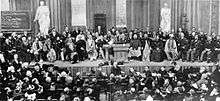
Swami Vivekananda (At the World Parliament of Religions): I... appointed Mrs. Besant special delegate to speak there on behalf of the whole (Theosophical) Society. How great a success it was for us and how powerfully it stimulated public interest in our views will be recollected by all our older members.
- The significance of Annie Besant’s political activities lay in building up step a heightened sense of public resentment against the iniquitous and oppressive British rule in India, which other political leaders were to seize on to launch a full-scale anti-imperial agitation in the country in 1919. Thus it was from Annie Besant’s intellectual and moral capital that Mahatma Gandhi was to derive immense resources to sharpen his weapons of satyagraha to fight the British and to free the country from the fetters of foreign rule.
- V.N. Datta, in Annie Besant: a sensitive reappraisal
- Annie Besant’s book where she put forward the idea that theosophical mystical energies could be portrayed as colours or abstract shapes was practically the invention of abstract art. A lot of artists rushed out and read it and suddenly thought, ‘oh God you could, you could portray love as a colour, or depression as a colour” All of a sudden abstract art happens, a flowering out of occultism.
- Alan Moore De Abaitua interview (1998)
- As the World's Parliament of Religions 1893 was to meet at Chicago in the following September, and as it had been arranged that our Society should participate in it, I deputed the Vice-President, Mr. Judge, to represent me officially, and appointed Mrs. Besant special delegate to speak there on behalf of the whole Society. How great a success it was for us and how powerfully it stimulated public interest in our views will be recollected by all our older members. Theosophy was presented most thoroughly both before the whole Parliament, an audience of 3,000 people, and at meetings of our own for the holding of which special halls were kindly given us. A profound impression was created by the discourses of Professor G. N. Chakravarti and Mrs. Besant, who is said to have risen to unusual heights of eloquence, so exhilarating were the influences of the gathering. Besides these who represented our Society especially, Messrs. Vivekananda, V. R. Gandhi, Dharmapala]], representatives of the Hind Vedanta, Jainism, and Buddhism respectively, captivated the public, who had only heard of the Indian people through the malicious reports of interested missionaries, and were now astounded to see before them and hear men who represented the ideal of spirituality and human perfectibility as taught in their respective sacred writings.
- Henry Olcott reporting on the Theosophical Society presentation at World's Parliament of Religions in 1893, in Old Diary Leaves, Fifth Series (1893-96)
- Welcome sister, the ever unfortunate mother India takes you to her bosom. Now she has nothing precious of which she can make a present to you; but she is ready to receive you with Shamit (sacrificial fuel), Kushahan (a seat made of sacrificial grass), Padya (water for washing the feet with), Arghya (respectful oblation) and sweet words. What has brought you sister, here? India is now lifeless. Here is now no chanting of the Vedas, no Tapobana (garden for practising religious austerities), no twice-born, no uttering of Mantras (mystical incantation) Now the cry of the famine-stricken people rends the sky.
We, the inhabitants of Berhampore, give a garland of flowers round your neck; please take it, simple sister, with your characteristic affability.
You are now a learned daughter of mother India, you are honoured throughout the world and your reputation is world-wide. We are glad to see you.
- She loved India with a fervor and devotion all her own. Our country’s philosophy, our history or legends, our spiritual heritage, our achievements in the past, our sorrows in the present, our aspirations for the future were part and parcel of Mrs Annie Besant’s own life.
- Sri Prakasa in Indian Political Thought, p. 191
- Besant was an amazing teacher who wrote many books and played a key role in the early years of the Theosophical Society]].
- Paul Tice, in The Path of Discipleship, p. 3
See also
External links



- Works by Annie Besant at Project Gutenberg
- Theosophy Wiki
- Recorded Webinars The Ancient Wisdom by Annie Besant
This article is issued from
Wikiquote.
The text is licensed under Creative
Commons - Attribution - Sharealike.
Additional terms may apply for the media files.